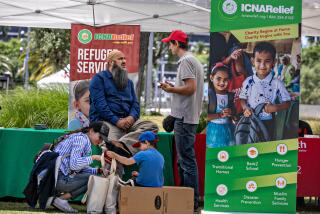Soviet-Era Immigrants to America Greet Newcomers With Suspicion : Human relations: Those who fled Eastern Europe for political reasons say new arrivals are simply out to get rich quick.
- Share via
NEW YORK — Before communism crumbled, immigrants from the Soviet Union and Eastern Europe flocked to the United States for freedom and democracy.
Today they come for something else.
“Now you have people who just want to get rich, it doesn’t matter how,” said Ena Ghyka of Arlington, Va., who fled Romania in 1976.
“It’s a different breed, completely different,” said Irene Nikitin, 71, of San Francisco, a World War II refugee from Kiev.
The latest wave of immigrants from Russia and her former satellites is getting a chilly reception from some of those who came before.
Communist-era refugees were escaping political or religious persecution, which gave their immigrant status a martyr-like glow. They see the newcomers as everything from rude to morally bankrupt, lured to the United States by VCRs and fast cars. And they hold the Iron Curtain responsible.
“The people on top of the social pyramid were stealing--there was no morality. Everybody was stealing, everybody was cheating. For years it became a habit, built into their nervous system,” said Andrew Kawecki, 58, a staff writer for the Polish Daily News in Chicago.
Kawecki said he had the same “bad habits” to break when he came from Poland 20 years ago, but it may be harder for those who lived that way longer.
“Some newcomers are cheating everyone from IRS to friends,” Kawecki said. “They wouldn’t obey the rules. . . . They are destroyed from the inside. And it’s not their fault. It’s the system.”
Newcomers don’t deny a communist society left a mark on its people.
“We were as blind cats in the former Soviet Union because we believed in communism and other things,” said Lyba Mikityanskaya, who arrived from Ukraine last year. “Now we come to this country and we see we were wrong.”
But they point out that life has gotten harder in the former Soviet Union and Eastern Europe, with anti-Semitism, crime and ethnic clashes on the rise.
“People who are coming now are much more like refugees, escaping a war zone,” said Vladimir Vishnevskiy, 36, who came from Russia 3 1/2 years ago. “People who came before were like prisoners escaping prison.”
Yes, they long for a better life, he said. And why shouldn’t they?
Friction between the old guard and newcomers is nothing new in this country of immigrants, said Arthur Helton, director of migration programs at the Open Society Institute. Those who settled on the Lower East Side of Manhattan at the turn of the century, for example, were “reviled and demonized” by other Americans, including those who came before, he said.
But a fierce ideological conflict, now as dead as the Cold War and the “evil empire,” makes this situation unique in recent immigrant history.
“It’s a difference between people who are brought up under a totalitarian, communist, paternalistic system and those who have absolutely no knowledge of that kind of system,” said Pauline Bilus, head of Action for Russian Immigrants, a resettlement program in Brighton Beach.
“We’re talking primarily about a 70- to 75-year gap--or what I call a black hole--of people who have lived under this totalitarian system. This great experiment that became a dismal failure.”
So dismal that many people didn’t want to stay to pick up the pieces.
Immigration to the United States from the region has increased sharply since the Iron Curtain rose. Immigrants admitted from former Soviet republics alone went from 11,100 in 1989 to 58,500 in 1993, according to the Immigration and Naturalization Service.
More to Read
Sign up for Essential California
The most important California stories and recommendations in your inbox every morning.
You may occasionally receive promotional content from the Los Angeles Times.













